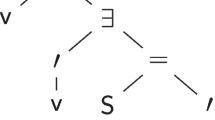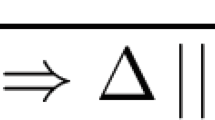Abstract
Weak ontic necessity is the ontic necessity expressed by “should” or “ought to”. An example of it is “I should be dead by now”. A feature of this necessity is that whether it holds is irrelevant to whether its underlying proposition holds. This necessity essentially involves time. This paper presents a logic for conditional weak ontic necessity in branching time. The logic’s language includes the next instant operator, the last instant operator, and the operator for conditional weak ontic necessity. Formulas are evaluated at tuples consisting of a tree-based model, a context, a timeline, and an instant. A context is a set of ordered ontic laws determining expected timelines. When evaluating conditional weak ontic necessity, we first update the context with the antecedent, then check whether the consequent holds with respect to the updated context. We discuss some consequences of the formalization and compare it to some related work. We study the logic’s expressivity and axiomatize a special validity of it.
Similar content being viewed by others
Data availability
The author confirms that this article is theoretical research and data sharing is not applicable to it.
References
Adams, E., Subjunctive and indicative conditionals, Foundations of Language 6(1):89–94, 1970.
Barker, S., Predetermination and tense probabilism, Analysis 58(4):290–296, 1998.
Copley, B., What should “should” mean?, in Proceedings of Language Under Uncertainty Workshop. Kyoto University 2006.
Davis, W., Indicative and subjunctive conditionals, The Philosophical Review 88(4):544–564, 1979.
Dudman, V., Parsing “if”-sentences, Analysis 44(4):145–153, 1984.
Edgington, D., Counterfactuals and the benefit of hindsight, in P. Dowe, and P. Noordhof, (eds.), Cause and Chance: Causation in an Indeterministic World, Routledge, 2004, pp. 12–27.
Edgington, D., On conditionals, in D. Gabbay, and F. Guenthner, (eds.), Handbook of Philosophical Logic, Springer Netherlands, 2007, pp. 127–221.
Finlay, S., Oughts and ends, Philosophical Studies 143(3):315–340, 2009.
Ju, F., A logical theory for conditional weak ontic necessity based on context update, Journal of Logic, Language and Information arXiv:2208.11917, 2022.
Kratzer, A., Conditional necessity and possibility, in R. Bäuerle, U. Egli, and R. von Stechow, (eds.), Semantics from Different Points of View, Springer Berlin Heidelberg, 1979, pp. 117–147.
Kratzer, A., Conditionals, Chicago Linguistic Society (CLS) 22(2):1–15, 1986.
Leech, G., Meaning and the English Verb, Longman Group Limited, 1971.
Lewis, D., Counterfactuals, Harvard University Press, 1973.
Lewis, D., Counterfactual dependence and time’s arrow, Noûs 13(4):455–476, 1979.
Matthewson, L., Modality, in M. Aloni, and P. Dekker, (eds.), The Cambridge Handbook of Formal Semantics, Cambridge University Press, 2016, pp. 525–559.
McNamara, P., Must I do what I ought? (or Will the least I can do do?), in M. Brown, and J. Carmo, (eds.), Deontic Logic, Agency and Normative Systems, Springer London, 1996, pp. 154–173.
Nute, D., Historical necessity and conditionals, Noûs 25(2):161–175, 1991.
Rott, H., Moody conditionals: Hamburgers, switches, and the tragic death of an american president, in J. Gerbrandy, M. Marx, M. de Rijke, and Y. Venema, (eds.), Essays Dedicated to Johan van Benthem on the Occasion of His 50th Birthday, Amsterdam University Press, 1999, pp. 98–112.
Stalnaker, R., A theory of conditionals, in N. Rescher, (ed.), Studies in Logical Theory (American Philosophical Quarterly Monographs 2), Oxford: Blackwell, 1968, pp. 98–112.
Swanson, E., Modality in language, Philosophy Compass 3(6):1193–1207, 2008.
Thomason, R., and A. Gupta, A theory of conditionals in the context of branching time, The Philosophical Review 89(1):65–90, 1980.
Thomson, J., Normativity, Open Court Publishing Company, 2008.
Veltman, F., Prejudices, presuppositions, and the theory of counterfactuals, in J. Groenendijk, and M. Stokhof, (eds.), Proceedings of the 1st Amsterdam Colloquium, University of Amsterdam, 1976, pp. 248–281.
Veltman, F., Making counterfactual assumptions, Journal of Semantics 22:159–180, 2005.
Yalcin, S., Modalities of normality, in N. Charlow, and M. Chrisman, (eds.), Deontic Modality, Oxford University Press, 2016.
von Fintel, K., and S. Iatridou, How to say ought in foreign: The composition of weak necessity modals, in J. Guéron, and J. Lecarme, (eds.), Time and Modality, Springer Netherlands, 2008, pp. 115–141.
von Fintel, K., The presupposition of subjunctive conditionals, in D. Fara, and G. Russell, (eds.), MIT working papers in linguistics 25, Cambridge, MA, 1998, pp. 29–44.
von Fintel, K., Modality and language, in D. Borchert, (ed.), Encyclopedia of Philosophy-Second Edition, Detroit: MacMillan Reference USA, 2006.
von Fintel, K., Conditionals, in K. von Heusinger, C. Maienborn, and P. Portner, (eds.), Semantics: An International Handbook of Meaning, vol. 2, De Gruyter Mouton, 2011, pp. 1515–1538.
Acknowledgements
I want to thank Valentin Goranko for his kind help during the development of this project. Thanks also go to the anonymous reviewers of Studia Logica. Of course, all errors are mine. This research was supported by the National Social Science Foundation of China (No. 19BZX137).
Author information
Authors and Affiliations
Corresponding author
Ethics declarations
Conflict of interest
The author declares that he has no conflict of interest.
Additional information
Publisher's Note
Springer Nature remains neutral with regard to jurisdictional claims in published maps and institutional affiliations.
Presented by Jacek Malinowski
Rights and permissions
Springer Nature or its licensor (e.g. a society or other partner) holds exclusive rights to this article under a publishing agreement with the author(s) or other rightsholder(s); author self-archiving of the accepted manuscript version of this article is solely governed by the terms of such publishing agreement and applicable law.
About this article
Cite this article
Ju, F. A Logical Theory for Conditional Weak Ontic Necessity in Branching Time. Stud Logica (2023). https://doi.org/10.1007/s11225-023-10076-z
Received:
Published:
DOI: https://doi.org/10.1007/s11225-023-10076-z




